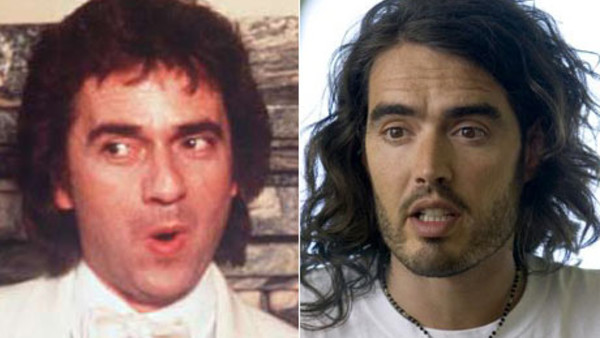Script Review: ARTHUR
A sneaky look at Peter Baynham's script for the 2011 remake of Arthur, starring Russell Brand.
Synopsis: Arthur is a happy drunk with no pretensions at any ambition. He is also the heir to a vast fortune which he is told will only be his if he marries Susan. He does not love Susan, but she will make something of him the family expects. Arthur proposes but then meets a girl with no money who he could easily fall in love with. Based on:Dudley Moore's 1981 classicWritten by: Peter Baynham (Borat, Bruno) Starring: Russell BrandDirected by: ? Info: Draft dated 16/10/09 - (118 pages) Status: Movie should film sometime 2010.Can anyone tell me how anyone came to the conclusion that the best man to fill Dudley Moores elegant shoes for the role of Arthur in a new adaptation of Steve Gordons 1981 classic was Russell Brand? On a simple comparison of achievements, Moore is out of Brands world, a comic genius whose art was defined best by a subtlety that made his relationship with Peter Cook so perfect, and his frequent steps onto the bluer side of comedy all the more affecting. Brand on the other hand, is tabloid bait- a professional bounder of sorts who pops up on panel shows or in a few film cameos here and there, and is generally more famous for who he is doing, rather than who he is playing. And he is the man charged with this relatively mammoth task. And it is a mammoth task: Arthur is a one-man-show, with a lot of screen time for its chief player, and nowhere to hide. Dont get me wrong, Im a fan of Brands particular brand of humour, and enjoyed it as far back as the days when he was riddled with heroin, and found no greater pleasure than in bamboozling clearly drug-ravaged post-festivities party-goers for MTV with luxurious philosophy and general japery. And his stand-up is perfectly self-aware, and genius, and peppered with the kind of delicious anecdotes that Keith Richards would likely blush at. I genuinely want him to succeed.



And from there, things actually do get better- the new Arthur character is very much another version of Brands own famous alter-ego character and the slipper very much fits. You can see this immature man-child being portrayed by no one else, thanks to the seamless writing, and some of the characters speech is effortlessly Brand-esque, marrying naughtiness with a certain eccentricity:Arthur, in expensive baggy yoga pants and collarless shirt, is doing self-invented yoga to Indian meditation music.
ARTHUR I give you Sideways farting spider.
Hobson is sitting, exasperated, going through various expenditures.
HOBSON Arthur, you have to stop giving money away! . ARTHUR Im a philanthropist.
HOBSON With the emphasis on the pissed. Really, what is it about unearned wealth that brings out such idiocy in those who have it and those who want it? The way youre going, youll have spent your inheritance before youve inherited it.
ARTHUR (shifts to new pose) Eagle pointing at lesbian.
Surprisingly nimble banter, peppered with hilarious and fairly unexpected profanity is always the best approach for comedy - especially comedy with an ostensibly British flavour, which hopefully the new Arthur aspires to retain in some way. And as for the other things it retains- there are the infamous lines still in there like Arthur's assurances about poets and alcoholics, and the music is rumoured to be making an appearance in some guise or another (probably recorded by modern musicians- but hopefully not tortured too much) - it looks as if Arthur will be just faithful enough without being an unnecessary scene-for-scene remake. One thing- I'm a big fan of swearing in the right context, when it is explosive and profoundly affecting, but I have a slight problem with the casual use of the word "cunt" in mainstream cinema, especially in a comedy that aims more towards an air of cheekiness than outright disgust, because of its everlasting severity. For me, it's one of those Anglo-Saxon words that just doesnt lose its power no matter how many times I hear it, and to include it in this light-punching comedy to try and add weight to the caddishness of Brand's Arthur is ill-measured and cheap, and the word sticks out like a sweary elephant in the room. Worse still, the script has more than one use of the contracted profanity "mo-fo", rather than the more crude "motherfucker", which seems absurd with a "cunt" wandering around unrestrained. This wild swing in tone isnt exactly unprecedented though- the high-flying date scene over the Hudson River that turns quickly from quirky humour, including the appearance of a junkie robber, to over-the-top violence, when said junkie produces a knife and slashes both Arthur's hand and his date's ear is another example of Peter Baynham's apparent lack of filter and consequent inability to judge the tone of his own script. Overall, the plot is a good one, though it feels very familiar even when you try to ignore the original Arthuras it is fundamentally just the age-old tale of a man torn between love/happiness and power/money/misery while pressurised by external forces who woul have him make the wrong (i.e. less enriching) choice. The familiar character models are all here, the bungling hero who will ultimately make the right choice (Arthur), the personified bad choice (his rich fiancee Susan) and her slightly malevolent exponent (Arthur's mother Vivienne), the personified good choice (Naomi) and the ultimate guiding light who will offer Arthur the key to his revelation (Hobson), and there is a certain pleasure to recognising them all for the functions they play.VIVIENNE Susan is 33 this year. Her egg inventory has dropped by 23% since you met her. You risk having no sons, or worse, some pea-brained hunchback who hugs everyone!
ARTHUR Great! I like hugs! And some of them are really good at math. (heading to the door) You know the Frog and Toad books?
VIVIENNE No.
ARTHUR Of course you dont. Hobson read them to me while you were off riding horses over stripey poles. Theyre about fun and friendship, not how many unspasticated tadpoles I can squirt up a rich girl.

